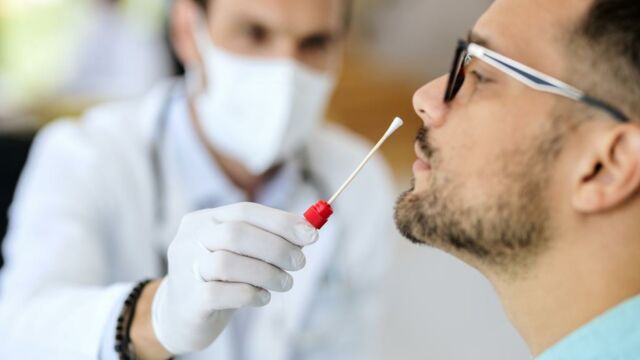Study finds men with low testosterone more likely to suffer severe COVID infection

A new study has shown that contrary to belief, men with lower testosterone are more likely to suffer a severe COVID infection.
Until now, scientists believed that high levels of testosterone were a risk factor when it comes to coronavirus due to the trend that men were hospitalised with the virus more often than women. But, new research has recently uncovered that the opposite is actually true: men with low testosterone are more likely to suffer from severe COVID infections.
Discover our latest podcast
Study finds links between low testosterone and severe coronavirus infection
A new study by the Washington University School of Medicine has found that low testosterone levels in the blood were linked to a more intense bout of COVID. The study could not conclude whether low testosterone was the cause of these nastier infections, but they were at least an indicator of other causal factors.
More under this adMore under this adResearchers have now cautioned ongoing clinical trials investigating hormone therapies as potential remedies and preventative measures for COVID-19.
Conducting the study, the researchers measured hormones from the blood samples of 90 men and 62 who went to Barnes-Jewish Hospital with symptoms of coronavirus and had then tested positive. Out of these 152 people, 143 were then admitted to the hospital, where doctors continued to measure their hormones on days 3, 7, 14 and 28, or until the patients were discharged.
More under this adMore under this adResearchers found that there was no correlation between hormones and the intensity of COVID infection. But, among men, testosterone levels did show patterns of being extremely low.
For reference, testosterone levels of 250 nanograms per decilitre are already considered to below average. For men admitted to hospital with severe coronavirus infection, testosterone levels averaged at just 53 nanograms per decilitre. And, by the third day of admission, those with the most severe infections had an average of a mere 19 nanograms per decilitre. Additionally, 37 patients, 25 of whom were men, died throughout the study.
More under this adMore under this adThose with a more mild infection had a higher level of testosterone at 151 nanograms per decilitre. Still, this number is 40% lower than what is considered normal.
Sandeep Dhindsa, MD, Study First Author and Endocrinologist, Saint Louis University, explained:
The groups of men who were getting sicker were known to have lower testosterone across the board. We also found that those men with COVID-19 who were not severely ill initially, but had low testosterone levels, were likely to need intensive care or intubation over the next two or three days. Lower testosterone levels seemed to predict which patients were likely to become very ill over the next few days.More under this adMore under this ad
Testosterone in COVID patients could be an indication of underlying causal conditions
The study showed a clear pattern, the more severe the coronavirus infection was, the less testosterone the person had. However, testosterone levels were not concluded to be responsible for the severity of illness but an indication of other underlying causal factors.
Researchers noted that other factors associated with severe coronavirus infections often went hand in hand with low testosterone levels, such as diabetes, obesity, and advanced age.
More under this adMore under this adLower testosterone levels were also associated with higher levels of inflammation and an increase in the activation of genes that can circulate sex hormones inside the cells. Researchers believe that this gene activation could be the body’s way of adapting to a lower testosterone environment. Researchers are yet to know what implications this adaptation may have and are calling for more studies.
Senior author Abhinav Diwan, MD, a professor of medicine, explained:
We are now investigating whether there is an association between sex hormones and cardiovascular outcomes in long COVID-19 when the symptoms linger over many months. We also are interested in whether men recovering from COVID-19, including those with long COVID-19, may benefit from testosterone therapy. This therapy has been used in men with low levels of sex hormones, so it may be worth investigating whether a similar approach can help male COVID-19 survivors with their rehabilitation.More under this ad